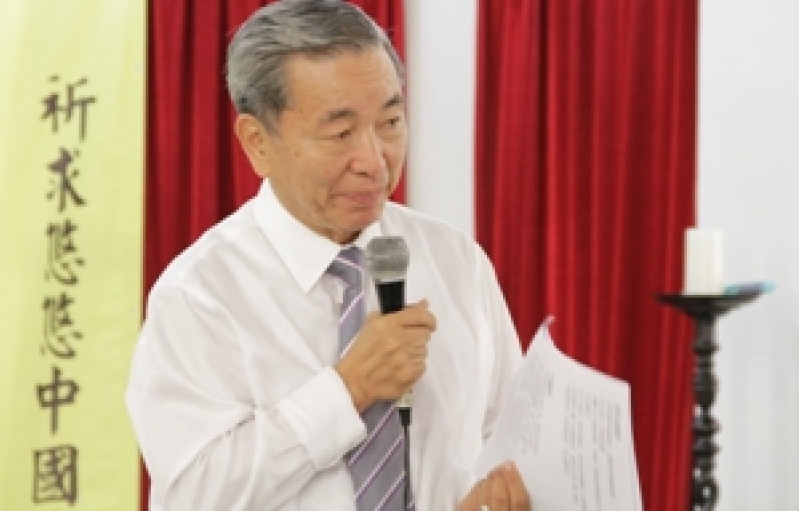
In 1989, the “June 4th” pro-democracy massacre broke out in Beijing, which left profoundly vivid images in Hong Kong residents.
The students’ silent sittings, slogans, hunger strikes, tanks, banners, plazas at night, the sounds of gunfire and mourning, crying, and bloodshed…many family members of victims still suffer from the wounds that have not healed. The candlelight memorial evenings in Hong Kong have lasted for the past 24 years.
Last year, Chai Ling, the renowned June 4th Tiananmen movement leader, published an article titled “I Forgive Them,” in Huffington Post, which initiated vast debate. Speaking of “forgiveness” and “June 4th” together is something foreign, and her “forgiveness theory” has sparked resentments and anger within the Church community, in the name of injustice. On the contrary, some members feel that on a personal faith level, the spirit of forgiveness can be applied to the June 4th event.
Dr. Philemon Choi Yuen wan, the Honorary Secretary General of the Hong Kong-based Breakthrough Organization, has insisted on attending the annual June 4th memorial prayer service in the past 24 years. He is also one of the leaders of the patriotic Christian Democratic Movement in Hong Kong.
Following last week’s prayer service, Gospel Herald Hong Kong reporter used Chai Ling’s “forgiveness theory” to initiate a brief discussion on the June 4th event with Choi from the perspective of “forgiveness.”
Choi said: “Forgiveness is already there, but when there is no repentance, there is no forgiveness. There is no ‘cheap grace.’ Forgiveness is grace. God fulfilled forgiveness on the cross, but there had to be contrition and humility to enable forgiveness. I wish that the Church does not promote ‘cheap grace,’ but ‘costly grace’ instead. Forgiveness is not one-way. God always extends a forgiving hand, but you have to kneel down, repent, and ask for forgiveness, so this is a two-way street.”
To those who suffer from injustice, is forgiveness the spiritual resolve?
Choi said: “Some things, once occurred, cannot be reversed. A death is a death. Forgiveness is eternal hope and the real justice lives in this eternity. You have lost, and this hurt cannot be forgotten, and can forever be irreplaceable. Thus our faith provides forgiveness and hope, to find justice in eternity.
“Surely, we hope that this justice can be witnessed during our lives on earth, but the healing of those who lost family members is different, or else, they will still be waiting. Waiting is suffering, day after day after day, and without justice happening, forgiveness and reconciliation are never fulfilled.”
However, justice often comes at a later time. If the people involved do not repent, is it then not possible for forgiveness to be fulfilled?
“Forgiveness is already here, but not quite yet fulfilled. We become Christians because of the cross, so we are all ready to forgive. But at the same time, God is waiting, just as a father is waiting for a son to return home in order to be complete. Right now, Father is waiting, and we are waiting. We surely hope that this moment can be witnessed during our time, but for how long do we have to wait?” He said.
How can the next generation contribute to June 4th?
Choi often encourages our youths to learn about the June 4th event. How can they contribute?
“I increasingly do not believe in speaking, but in doing. If you say that you wish to enter the land of China and love mercy, then do not just shout out slogans or attend a few candlelight memorials. These are just beginnings. More actions must come so as to ‘gain admittance’ into those places in China which need healing and justice.
“Surely, every country has its own regulations, but space is created by God, and there is nothing impossible even in those places that are most restricted. There is always going to be restrictions and regulations everywhere in the world in every generation,” he said.
Hong Kong residents are looking forward to the nation’s fair treatment towards the June 4th event, but how do Christians differ in terms of enforcing justice?
“We have hope, we have love, and we have faith. We believe that God is just, and we know that only love can change. We hope that God will bring forth justice, and that is why we are different.
“Without hope, there is only retaliation. We do not retaliate, but reconcile. There is a difference: the former is revengeful, an eye for an eye, a tooth for a tooth. We are not this way: we use action through prayers to fulfill justice and mercy. However, when a person repents is hard to predict, but we believe that this day will come,” he said.
The retired Choi often travels with family to places like Sichuan, Lanzhou, Beijing to encourage spiritual recovery and growth. In the 2008 Sichuan earthquake, he participated in the Sichuan medical rehabilitation team (part of the reconstruction directional committee), and travelled 33 times within 3 years to and from the affected regions. He recruited and trained some 200 volunteers from Hong Kong and China, and helped the victims recover spiritually.
Choi uses himself as an example to illustrate to youths in Hong Kong his patriotic style – not through the clanging noises of the gongs or cymbals, but through actions in hope.
[Editor's note: Carol Lee translated the report.]







